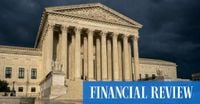In a dramatic intervention on Saturday, April 19, 2025, the US Supreme Court temporarily barred the Trump administration from deporting a group of Venezuelan migrants accused of gang membership. This unprecedented ruling halted the administration's use of the 1798 Alien Enemies Act, a wartime law that had not been invoked for deportations since World War II. The decision comes amidst rising tensions over immigration policies and the administration's aggressive stance against what it labels as violent criminal gangs.
The court's ruling followed an emergency appeal from the migrants' lawyers, who argued that their clients faced imminent deportation without the judicial review previously mandated by the justices. The court stated, "the government is directed not to remove any member of the putative class of detainees from the United States until further order." This order was a response to plans by the Trump administration to expel dozens of Venezuelans under the act, which would have allowed for deportations with little to no due process.
President Donald Trump has justified these deportations by asserting a crackdown on violent Venezuelan gangs, which his administration has classified as terrorist organizations. However, critics argue that this policy undermines constitutional rights and due process. The American Civil Liberties Union (ACLU), which has been actively challenging the deportations, welcomed the Supreme Court's decision. ACLU attorney Lee Gelernt stated, "These men were in imminent danger of spending their lives in a horrific foreign prison without ever having had a chance to go to court."
The ruling has sparked a heated debate over the use of the Alien Enemies Act, which was last employed during significant wartime periods, including World War II. The act has been criticized for its historical implications, particularly its previous use to intern Japanese-Americans. The current administration's application of this law to deport Venezuelan migrants has raised alarms among civil rights advocates and legal experts alike.
As the court's decision unfolded, the Trump administration filed a motion urging the justices to lift their order, asserting that it should not be prevented from using the Alien Enemies Act to deport individuals deemed terrorists. The administration also argued that even if the court blocked the current deportations, it should clarify that such actions could proceed under other laws.
In the lead-up to the Supreme Court's ruling, reports emerged indicating that over 50 Venezuelans were scheduled to be deported to a notorious prison in El Salvador known for holding gang members. The administration has already deported more than 200 individuals, including Kilmar Abrego Garcia, a Maryland resident who was sent to the prison due to what the administration later acknowledged was an "administrative error." This case has highlighted the administration's controversial approach to immigration enforcement.
Trump's election in November 2024 was largely fueled by promises to combat illegal immigration, with rhetoric portraying migrants as threats to public safety. His administration has taken aggressive measures, including deploying troops to the Mexican border and imposing tariffs on Mexico and Canada to curb illegal crossings. The focus on specific gangs, such as Tren de Aragua and MS-13, has resonated with segments of the electorate concerned about crime and immigration.
However, the administration's tactics have drawn criticism from various quarters, including civil rights groups and legal scholars who argue that the summary expulsions violate due process rights. Many migrants have been accused of gang affiliation based on limited evidence, and reports suggest that some were targeted due to tattoos. In Abrego Garcia's case, the Trump administration's insistence that he was a gang member led to widespread backlash, particularly after it was revealed that he had been deported in error.
As the legal battles continue, the implications of the Supreme Court's ruling extend beyond the immediate fate of the Venezuelan migrants. It raises fundamental questions about the balance of power between the executive and judicial branches of government. Trump's administration has often challenged judicial authority, leading to concerns about a potential constitutional crisis.
The dissent from conservative justices Clarence Thomas and Samuel Alito indicates a division within the court regarding the limits of executive power in immigration matters. As the Trump administration navigates these turbulent waters, the outcome of this case could set significant precedents for future immigration policies and the interpretation of the Alien Enemies Act.
In a broader context, the Supreme Court's ruling comes at a time when immigration remains a contentious issue in American politics. The debate over how to handle migrants, particularly those fleeing violence and persecution, continues to polarize the nation. As the Trump administration pushes forward with its aggressive immigration agenda, the legal challenges and public outcry highlight the complexities of balancing national security with human rights.
The Supreme Court's temporary stay on deportations offers a moment of relief for the Venezuelan migrants and their advocates, but the future remains uncertain. With the administration's determination to enforce its policies, the legal and ethical ramifications of these actions will likely continue to unfold in the coming months.
As the situation develops, the eyes of the nation remain fixed on the Supreme Court and the ongoing battle over immigration policy, civil rights, and the limits of presidential power.






